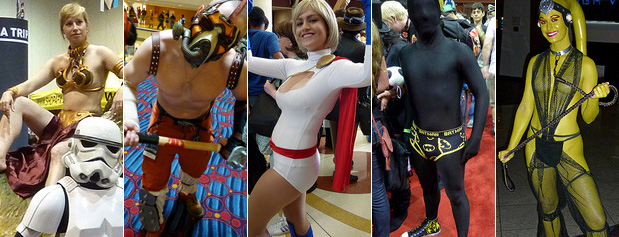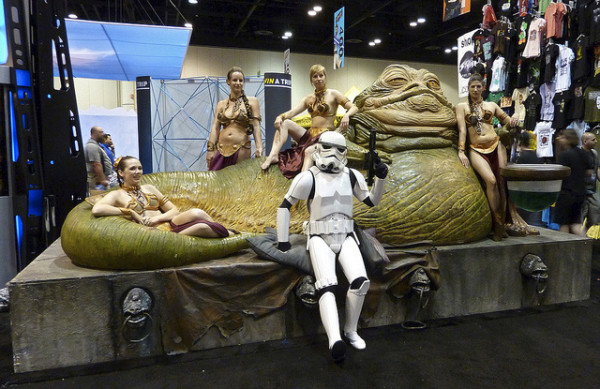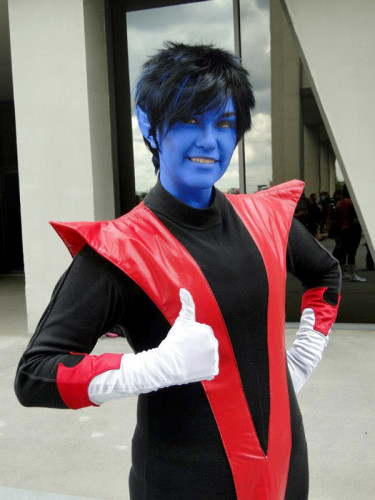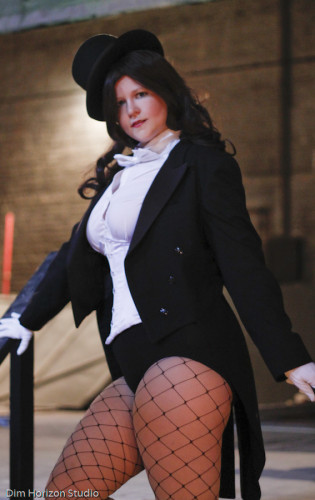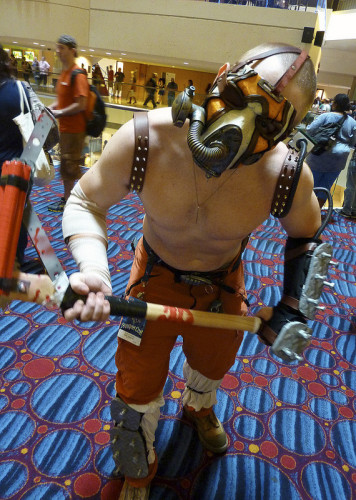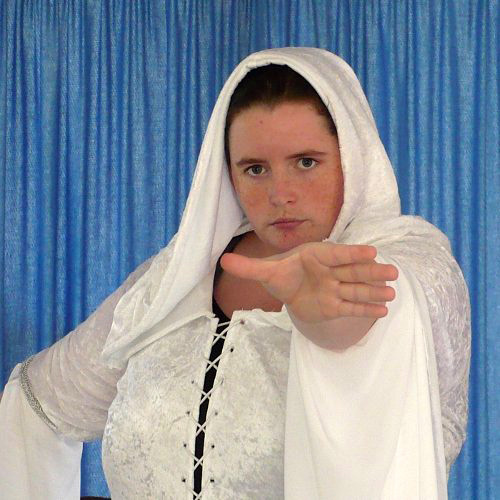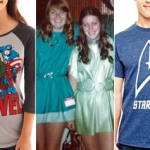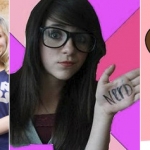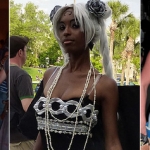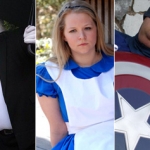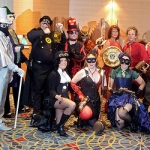The popularity of conventions in the nerd/geek community is due in large part to the freedom participants feel to express their particular fandom with enthusiasm and devotion in an atmosphere that is comfortable and safe. For cosplayers, that safety has been eroded over the past few years because of the rise of inappropriate behavior displayed by regular convention attendees. Lewd behavior and lewd comments that, in a different setting, would be officially labeled harassment and assault are some of the “hazards” cosplayers expect to encounter at conventions.
It ranges from mostly harmless and annoying actions like taking general, candid photographs without permission or ogling certain body areas to more overt methods like inappropriate touching, lewd comments, threats of bodily harm, and stalking. Often, cosplayers — especially females — discover candid pictures posted on the Internet focused on their bottoms, breasts, and up-skirt shots. Cosplayers of all genders have been groped and propositioned by attendees. Members of the cosplay fandom are losing the veneer of emotional and physical safety provided by the convention atmosphere. Female cosplayers get male friends, boyfriends, or relatives to walk with them, watching for and guarding against uncomfortable, unwelcome behavior.
Cosplayers view the way they display fandom as a tribute to a character. Their devotion is expressed in the effort and money spent to turn oneself into a favorite character. It’s often their primary creative and social outlet. However, a viewpoint has arisen among certain groups of non-cosplayers that the willingness to wear a character’s costume in public equals seeking the sexual attention of others. The downside is that being in costume changes the way people look at someone. They don’t see the person; they see the character, a created object.
Conventions are not an excuse to act creepy or pervy toward another person, or to cover the attitude under the umbrella of social awkwardness. A “sexy” costume or even a “hot” girl does not give a person license to voice comments or take pictures they would not be willing to say or show in other public environments. Blaming the costume for inappropriate behavior and comments is a way of shifting the blame from the perpetrator to the cosplayer. It happens to the guys, too. Many spandex-clad superheroes have been the victims of crotch and butt grabs and lewd comments. For females, to produce an “accurate” portrayal of certain characters, wearing a tight body-suit or leotard is required — like Wonder Woman, Super Girl, Batgirl, Poison Ivy, to name a few. A person dressed in this fashion, bending over a box of comic books or photographs at a vendor table, is most likely trying to find ones they geek out about. They are not posing in a manner that forces anyone to photograph their body parts.
Because the belief exists that cosplaying is an attention-seeking activity, some people feel entitled to say inappropriate things or snap pictures. When cosplayers request permission be asked before taking photos, an oft-used counter-argument is that it’s legal to take candid photos at an event such as a convention. A lot of the time, people try to pass off lewd comments to cosplayers as jokes. The same comments would violate sexual harassment policies in most work environments.
The issue over what is inappropriate or not has spilled over into the gaming and comic book industry, where many cosplayed characters originate. Tony Harris, a two-time Eisner Award-winner and well-known comic book illustrator, made headlines for posting a tirade about female cosplayers on his Facebook page, calling them fake geeks and insinuating they only participate for the purpose of sexual arousal of men. It’s a mindset that attractive nerd/geek women must first prove their geekdom or risk being labeled as a “fake” or a “slut”. Harris is by far not the only male in the industry who has crafted this sort of post.
In March 2013, at PAX, gaming industry insider and well-known cosplayer Meagan Marie hosted a gathering of Tomb Raider cosplayers. A journalist asked for an interview, and his very first question was sexually oriented. The group of women cosplayers involved ranged in age from 15-31. When Marie called him on being rude and unprofessional, the reply was since they were dressed sexy, they were obviously okay with such questions. (Note: This incident has been posted about by Meagan Marie on her blog and referenced in numerous other articles talking about consent and cosplay. PAX responded at the event as soon as the incident was reported to them.) In a blog post, she related that one of his responses was, “the girls were dressing sexy, so they were asking for it.” Marie was one of the first wave of prominent cosplayers to speak publicly against the idea that cosplayers are “asking for it” (sexually-oriented attention).
This week’s question for our cosplay roundtable:
Have you ever experienced or witnessed unwanted advances or rude/lewd remarks from convention attendees?
Katie: “I have. Several years ago at Dragon Con, I was staying in the Marriott and had to meet up with folks at the Hyatt. Since I’m a huge nerd, I was dressed as Tiger Tan, the anthropomorphic version of OSX 10.4 based on Troubled Windows. I got cat-called a good bit just walking between the hotels. Lots of “Here, kitty, kitty”. Recently, I’ve started cosplaying Carol Marcus. I have had con-goers stop me and ask me to re-enact a certain scene from Star Trek: Into Darkness for them.
If you’re a girl that matches the description laid out in “Baby Got Back”, you will get a lot more attention. Guys can have a bit of a double-edged sword. They don’t seem to need as many costumes as the girls, but to get ANY attention, theirs have to be phenomenal.”
Jonathan: “I have only seen leers and whistles [directed at] female cosplayers, but I know worse exists. I’ve come across guys being skeevy, especially when drunk.”
Wolfen M: “A few years ago, a friend of mine had a problem with a drunk stalker the last night of Dragon Con, when she was playing a superheroine. This guy I had seen talking with her struck up a convo with me while she posed for pics. He heard my friends talk about going to the con suite. A few moments after they left, asked what it was and asked me to show him where it was… My friends came back a short while later, upset that this guy, who had been bothering her all night, had found her again. I hadn’t realized he’d been talking my ear off as an excuse to stick around her. He showed up again a few minutes later. My friend’s boyfriend confronted him. After a shouting match and some shoving, we went and found security, and the guy finally left.
As for hostility towards gender, that seems to be of three types: a) accusations that a girl doesn’t know whom she is cosplaying and is just doing it for male attention; b) complaints that a gal isn’t pretty enough to play a character; or c) complaints that a gal’s cosplay is too revealing. I’ve only encountered mutterings in crowds, never seen actual confrontations, but I’ve read some horrible comments online.”
Kristen: “I have experienced it regardless of whether I am cosplaying as a male or female character. Once, when I was in my male dark elf costume, a very drunk woman came up to me to get her photo made and proceeded to hang off me and grab my butt the whole time telling me how hot I was. When I was cosplaying as Deanna Troi from Star Trek, a man ran past me and slid his hand up under my skirt and across my butt as he jogged by. Both encounters were frustrating. I did tell the woman to kindly ease up, which she did, thankfully. The man ran by so quickly, though, that I was unable to do anything more than shoot him an outraged look.”
Jackie: “I have experienced remarks about my size and how I shouldn’t wear certain things, but I have witnessed and heard many rude remarks about other cosplayers. Most of the remarks come from men who think it’s okay to verbally abuse us [women cosplayers] or physically harass us because of the way we dress. Many female cosplayers are beginning to fight back by coming to the aid of those being harassed and reporting those who are harassing to event organizers.”
When a cosplayer is a victim of harassment, the incident often catches them too off guard and is too shocking for the person to be angry or upset at that moment. The inaction stems from surprise, lack of maturity, or not enough experience in cosplay to know how to react. The “silence” or failure to speak up is misinterpreted as a person being okay with questionable behavior or comments.
Cosplayers and convention-goers are taking a stand against inappropriate behavior, touching, comments, and photographs. Public campaigns such as the “Cosplay is Not Consent” movement and 16 Bit Sirens’ “Costumes ≠ Consent” initiative are bringing needed attention to this issue. Most conventions across the country have established harassment policies that are published in their programs.
Remember: under the costume, makeup, and wig is a person, a fan like you. Cosplayers bring a character to life, but are not that character. Respect their space and bodies. Ask before taking photographs and don’t touch anyone in a place you would not touch a co-worker or family member. Compliment the quality of work and creativity that has been put into a costume. Cosplayers have a right to feel safe and valued as they express their fandom. Above all, remember that a costume is not consent, no matter how “sexy” it is considered. Before you make the judgment on how sexy a costume/cosplayer appears, compare how accurate the outfit is to the character. The true responsibility for a character’s appearance falls on the illustrators and writers that created the character, not those representing the character through cosplay.
Next article, we ask our roundtable what they wish non-cosplayer fans understood about the fans that make up the cosplay community.


